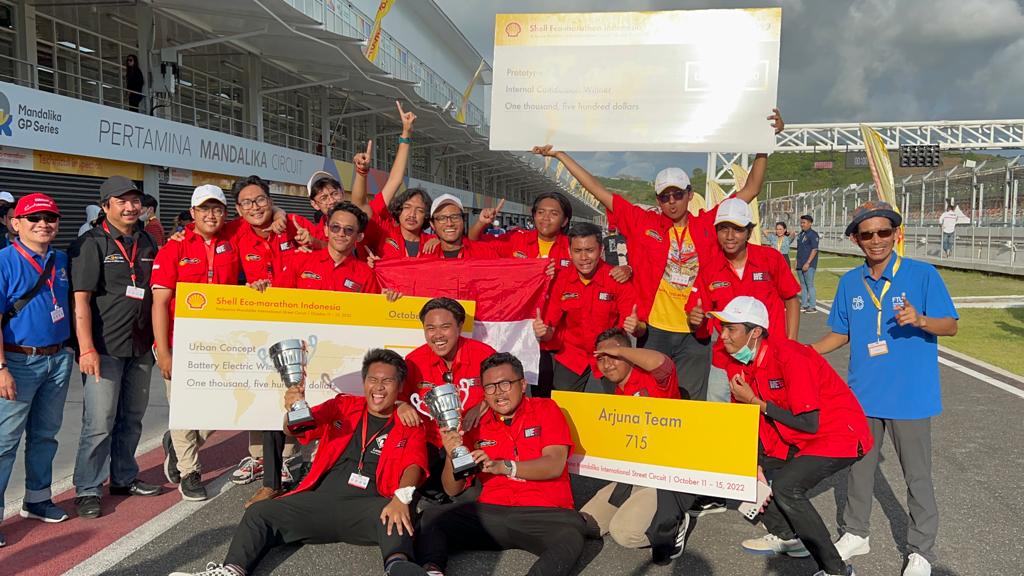Team Nakoela and Team Arjuna who are members of the University of Indonesia Supermileage Vehicle (UI-SMV) Team, recorded a sweet achievement in the international energy-efficient vehicle design competition in the Asia region “Shell Eco-Marathon (SEM) 2022” which took place in 2022 on 11-15 October 2022 at Pertamina Mandalika International Circuit, Lombok, West Nusa Tenggara. Nakoela took first place in the Prototype Internal Combustion Engine (ICE) class and Arjuna ranked first in the Urban Concept Battery Electric class. This victory repeats UI’s achievement of winning a double winner at the “Shell Eco-marathon Asia” in Manila, Philippines, in 2016.
There are six classes contested in this competition, namely Prototype Internal Combustion Engine (ICE), Prototype Battery-Electric, Prototype Hydrogen Fuel Cell, Urban Concept Internal Combustion Engine (ICE), Urban Concept Battery-Electric, and Urban Concept Hydrogen Fuel Cell. Of the six classes, the car designed by the Nakoela Team managed to set a record of 905.21 kilometers per liter (km/l) for the prototype class with a distance equivalent to Semarang-Lombok. Meanwhile, the Arjuna team succeeded in designing and testing a car capable of traveling 194.19 kilometers per kilowatt hour (km/kWh) for the battery electric urban concept class.
The Shell Eco-Marathon is a competition that challenges university students in various countries around the world to innovate to design, build, and test energy-efficient vehicles to answer future energy challenges. This year, the Shell Eco-Marathon was attended by 47 student teams from nine countries, namely Indonesia, India, Kazakhstan, South Korea, Malaysia, Nepal, the Philippines, Singapore, and Vietnam.
UI Vice Chancellor for Academic and Student Affairs, Prof. Dr. rer. grout. Abdul Haris expressed his gratitude, appreciation, and pride for the achievements of the UI-SMV Team and their supervisors who continue to make achievements at the international level. “This achievement is a form of student innovation and creativity in responding to future sustainable energy challenges as well as showing the need for cross-disciplinary collaboration to solve current problems. Hopefully, this achievement will be a motivation for the winners to continue to innovate and be an inspiration for other students to participate in their achievements, “said Prof. Harris.
The Nakoela team was guided by Dr.-Ing. Mohammad Adhitya consists of Rayhan Danendra Wiracalosa (Team Manager), Muammar Shaddam Kusnandar (Driver), Ariza Aulia Ghifari, Rai Zulfikar Satriagama, Yusuf Timothy Turnip, Arafa Maulana Abdillah, Mohamad Iqbal Risya, and Daffa Farhan Ahmad. Arjuna’s team was guided by Dr. Ir. Feri Yusivar, M.Eng. with student members, namely Edward Lumbanraja (Team Manager), Zahran Mizuya (Driver), Andriko Rasta Indriantomo, Muhammad Alfan Fuad Dzia Ul-Haq, Irvian Zakky Marta, and Zharfan Rosyad. The non-technical team that helped included Hana Nabila, Ivana Esteria, Nada Wahyudhia, Nabila Apsari Dwina Putri (FMIPA), and Farhan Manan Ramadhan.
The Dean of the Faculty of Engineering (FT) UI, Prof. Dr. Heri Hermansyah, S.T., M.Eng., IPU dedicates the victory of the UI-SMV Team to the Indonesian people and the University of Indonesia. “Since we first participated in SEM Asia in 2010 in Sepang Malaysia, we have dedicated the name of Team Nakoela to the father of the automotive department of the Department of Mechanical Engineering, FTUI, the late. Prof. Dipl.-Ing. Nakoela Sunarta. He is a former Head of the Department who has built Mechanical Engineering FTUI to become what it is today. This name continues to be used by the UI-SMV Team for every update of the car prototype that is contested in the future. Hopefully, this big name will continue to encourage UI students to work more and produce superior energy-efficient car designs and in the future have an impact on the Indonesian automotive industry, “said Prof. Harry.
The victory won by the UI-SMV Team was not without effort. According to Rayhan Danendra, the team has conducted research since June 2022 to find the right innovations so that the car can develop and meet the target of winning in each competition. He and his colleagues spent around 400 million rupiahs to create the vehicle that was contested at the Mandalika Circuit. That figure does not include other expenses for research needs.
During this competition, the team faced various challenges. The most difficult challenge is that they have to adapt to the Mandalika Circuit which is long and has many climbs. This is because the car is designed not to have a lot of power. In addition, the competitive environment of the Shell Eco-Marathon is also a challenge for them. Both the Nakoela and the Arjuna teams had to maintain their working habits to work more calmly during the competition.
“We always prioritize time discipline at work. From technical inspection, practice, and race, our cars are always the first to enter the track. In addition, when the car is racing or practicing, we record all the data we need so that our driving strategy becomes more mature in the race,” said Rayhan.
***
Public Communication Bureau
Faculty of Engineering, Universitas Indonesia

